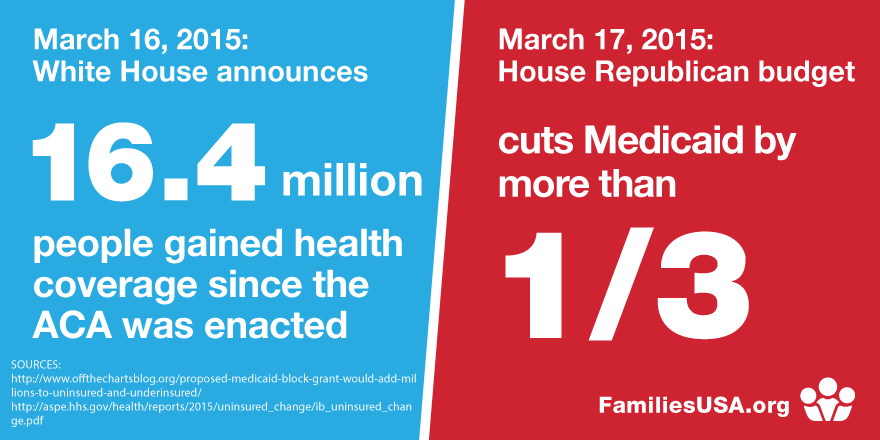
Budget Proposals Set the Stage for Cutting Access to Health Care. Again.
03.19.2015
This week, leaders in Congress released their budget plans for FY 2016. The budget plans put forward by Senator Mike Enzi (R-Wyoming) and Rep. Tom Price (R-Georgia) (the Senate and House budget chairmen) include massive cuts to the health care safety net and, in that respect, are similar to previous budget proposals advanced by former House Budget Chairman Paul Ryan (R-Wisconsin).
Health care implications of Republican budget proposals for FY 2016
The House budget. The House budget is more detailed than the Senate version in describing how access to affordable health care would be scaled back.
- The budget repeals the Affordable Care Act’s (ACA) expansion of coverage, eliminating protections for people with pre-existing conditions and the premium subsidies that help consumers buy insurance. However, it does keep the law’s revenue increases intact (some call this a gimmick).
- Due to the repeal of the ACA, the budget causes seniors to once again face a gap in prescription drug coverage by reinstating the Medicare “doughnut” hole.
- It turns Medicaid into a block grant by combining it with CHIP and then cutting the program by more than a third. This is on top of the elimination of the ACA’s expansion of Medicaid.
- Seniors who participate in Medicare could receive a voucher to purchase insurance. But because health costs are rising, both the Medicare voucher and the Medicaid block grant would pay for less and less health care over time.
In the words of The New York Times, these proposals are a “disaster.”

The Senate Budget. Senate budget also repeals the ACA and its benefits. The Senate plan contains fewer specifics about how Medicaid and Medicare would change, but the trillions in proposed cuts, along with the open-ended nature of the plan, have great potential to hurt consumers. Like the House budget, the Senate plan caps Medicaid funding to states for most pregnant women, parents, children, and those who need long term services and supports, including nursing home care.
The amount of Medicare cuts add up to $423 billion.
And even though both the House and Senate budget plans direct Congress to replace the Affordable Care Act, neither plan provides specifics on an alternative. In an earlier blog, we wrote that the variety of Republican replacement plans would cause millions to lose insurance and would increase health care costs.
Both the House and Senate budget plans propose funding the Children’s Health Insurance Program beyond its current expiration date in October 2015, though the plans lack critical details about how the program would be funded and for how long.
What’s new about these Republican budget proposals for FY 2016
While these budget proposals are similar to plans put forward by Rep. Paul Ryan over the past few years, the political context has changed dramatically since then—Republicans now control both chambers of Congress. Thanks to the new power dynamic, Republicans can now use a process called reconciliation to move these budget proposals forward. Reconciliation makes it easier for Congress to make changes to programs and avoid procedural roadblocks—like the filibuster in the Senate—that ordinarily give the minority party power (now the Democrats) to force a debate.
The Republicans can use reconciliation to cut Medicare, Medicaid, and the Affordable Care Act.
Both budgets require committees with jurisdiction over health care to make deficit-cutting proposals through this process by mid-summer.
What’s next in the budget process
Next week, the Senate and House will vote on their versions of the budget and then resolve their differences. If the House and Senate can come to agreement, Congress may begin voting on that legislation some time between June and August. Some of that legislation may include repealing all or parts of the health law and turning Medicaid into a block grant or a per capita cap program.
Given the president’s stance on health care, the president’s veto is a sure bet.
However, in a week in which the White House announced that 16.4 million consumershave gained health coverage since the Affordable Care Act began, it is a troubling sign that Congress chooses to focus on gutting access to health care rather than improving it.
